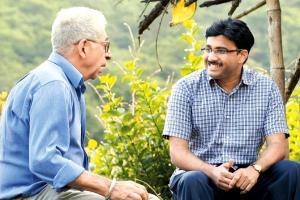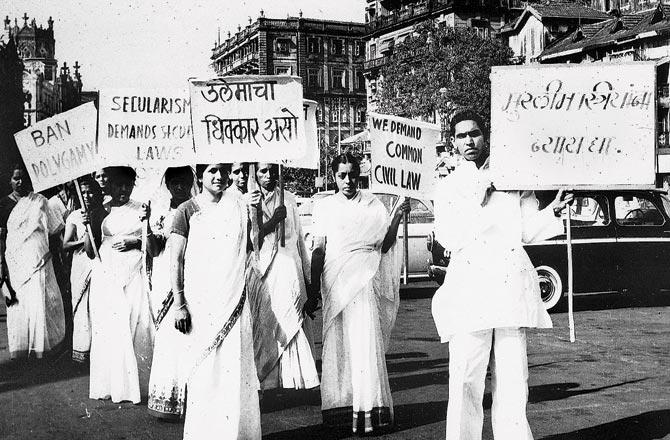Slain activist Narendra Dabholkar's son Hamid revisits the life of the social reformer he's been named after, Hamid Dalwai, through a film

Hamid Dabholkar (right) with actor Naseeruddin Shah who features in the hour-long documentary
It was when Hamid Dabholkar was in Class 3 or 4 in school that he first felt aware of his "Muslim" name. In history text books, while reading about Shivaji's battles against the Mughals, the concept of Hindu and Muslim, at least through nomenclature, started to become clear to children of that age, says Dabholkar, who would get teased by his classmates due to his name. When he told his father, rationalist Narendra Dabholkar [who was assassinated in 2013] about it, he explained to young Hamid that he was named after Hamid Dalwai, the Muslim reformer who later came to be known as the man who started the fight to abolish Triple Talaq in India. "Names have no religion, I was told and that was sufficient for me," Dabholkar tells us. His connection with Dalwai has gone beyond his name over the years. The 39-year-old social activist is now part of a documentary titled Hamid: Unsung Humanist that has been directed by veteran Marathi actor Jyoti Subhash. The film also features her daughter Amruta Subhash and Naseeruddin Shah, besides Dabholkar himself.
Shot in four days, the film traces the journey the trio undertakes to Mirjoli, the village in Ratnagiri, where Dalwai was born. His life is revisited through his family, the people he worked with and his writings. "They have had few interactions, but my father was a distant observer of Dalwai's work. He started the Andhashraddha Nirmoolan Samiti [ANS] 10 years after Dalwai's death, but he was active in the social reformist movement since the 70s itself. I can see strong parallels in their philosophy — my father was also a strong proponent of constructive criticism of religion and constitutional nationalism. Through this film I connected to both Dalwai and my father," Dabholkar says.

Hamid Dalwai seen at the forefront of the iconic 1966 march to Mantralaya which demanded secular laws for a secular country
However, initially, he was not keen to do the film. "I wasn't sure if I would be the right person to tell the story," says the reticent activist. But Subhash managed to convince him. "I have known his family almost all my life, I worked with his father when I was in Satara and we all come from the same school of thought. Also, to tell one part of Dalwai's story, I wanted someone who understands the passion of a social activist, and who better than Hamid Dabholkar himself? It took some convincing, but I managed to get the nod out of him," says the director, adding that her sole purpose behind making the film is to get the younger generation acquainted with Dalwai's life and works.
The timing cannot be more appropriate to revisit Dalwai, Dabholkar feels. "We are living in a highly polarised world in the name of religion. Dalwai was someone who tried to approach religion from a constitutional perspective. He had said once 'there is a great need for Hindus and Muslims to become Indians first'. While there have been social reformers in Hinduism and Christianity, Islam has hardly had a social reformer. Dalwai filled that gap. What my father stood for and got assassinated for has a connect with Dalwai's philosophy — they were both against radicalisation."
Dabholkar's personal discovery of Dalwai happened through various phases in his life. After he found what his name stood for, in his adolescent years he got acquainted with Dalwai's writings. "I learnt that he was deeply influenced by Mahatma Phule [better known as Jyotiba Phule]. Dalwai's organisation, Muslim Satyashodhak Sabha was named after Phule's Satyashodhak Samaj. Most of his [Dalwai's] books, except Muslim Politics of India, have gone out of print. Over the last four years, after my father's assassination, we have been trying to republish Dalwai's works through Sadhana (a socialist Marathi weekly publication). We have started to get them translated in English too," Dabholkar says. His deepest connect with Dalwai, however, came by after his father's assassination. "When I started my work in the ANS, that's when I truly realised what working in this field means, the undercurrents of political forces trying to radicalise the youth, making attempts to question religion potentially life
threatening."
Ask Dabholkar to talk about his role in the film and he calls it a "marginal one". "I look at Hamid Dalwai's life through the lens of a social activist. Naseeruddin and Amruta explore it from a more literary angle." Working with Shah was a "most enriching experience". "I got to know how well-read and sensitive a human being he is. He spoke of the traditional influences his family had on him and how he broke free of those. Until now, I had never thought of him as a Muslim, he was [and still is] an actor to me." Shah had attended the first death anniversary prayer meet of Narendra Dabholkar, which is where Hamid met him first. "He's a social thinker who is deeply engaged with this subject. He never once wanted to be treated as an actor in the film," adds Dabholkar.
Last Sunday when the film was screened in Pune it was widely applauded by the audience that included luminaries like Dr Shriram Lagoo and Amol Palekar. The team is planning to bring the film to Mumbai in September. Dabholkar says, "Nearly 70 per cent of the audience at the screening were aged between 20 and 35. That shows that the youth is interested to know about Dalwai. We want to take it everywhere in India and abroad. Dalwai was a global thinker. And, this film helped me know about his human side. A lot of social reformers, especially those of his stature, become very distant in their personal lives. They operate on a different beat. But revisiting Dalwai's family made me realise what a caring family man he was. That should be a template for all social activists."
Catch up on all the latest Mumbai news, crime news, current affairs, and also a complete guide on Mumbai from food to things to do and events across the city here. Also download the new mid-day Android and iOS apps to get latest updates
 Subscribe today by clicking the link and stay updated with the latest news!" Click here!
Subscribe today by clicking the link and stay updated with the latest news!" Click here!









